Jesper Hansen, Chief Commercial Officer at YesHealth Group in Taiwan, has played an instrumental role in establishing a business partnership with Danish start-up Nordic Harvest and setting up their first Indoor Vertical Farming (IVF) plant in Copenhagen. Jesper has, aside business planning and marketing, developed vertical farm designs and so far helped raise more than USD $100 million for vertical farming projects across the world.
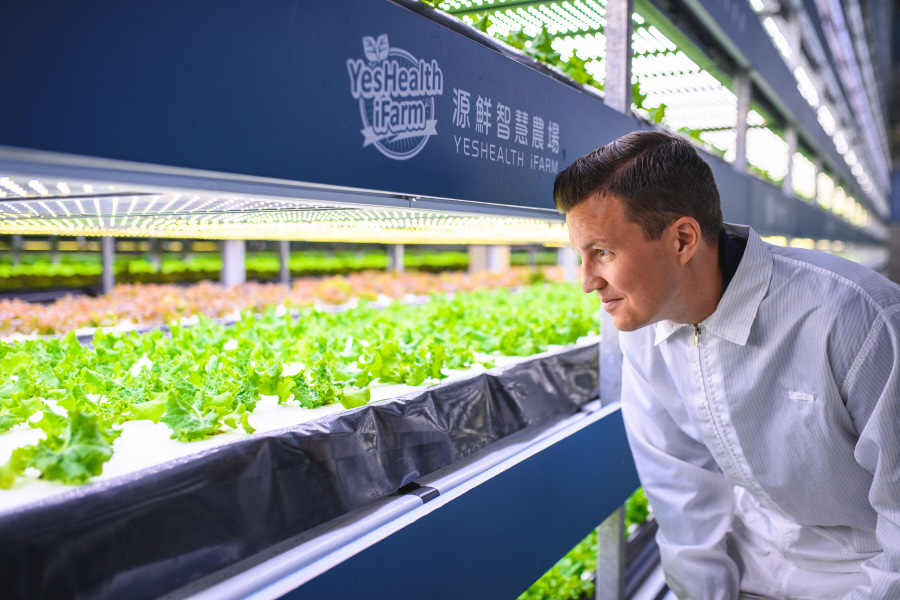
Following ten years of development and establishing Taiwan’s largest and profitable indoor vertical farm, further expansion in Denmark, the Nordics as well as in various countries in Asia is in the works. Their elaborate international expansion plan is based on developing technology, and building and operating such indoor vertical farming systems. Their farming technology is hydroponics-based; where plants grow in a solution of water and nutrients and no soil is used. This addresses climate change and food security challenges through sustainable and environment-friendly agricultural practices.
YesHealth Group is currently the largest vertical farming company in Asia, with own operations and proprietary technology that underpins their vertical farms such as engineering design, climate control systems, fertilizer and micro-biology, automation design, and data collection and management.
The launch in Denmark represents a crucial milestone and the first step in its elaborate international expansion plan. “We are by far the largest player in Taiwan and our main production unit is the largest farm provider for the major retailers, in addition to hotels,” says Jesper.
Chinese studies the beginning
Jesper got involved through the family business of his Taiwanese wife. So let’s rewind to how it all started with this Dane working for a Taiwanese company exporting to Denmark.
After taking a degree in history at the University of Copenhagen earlier, Jesper realised that being a historian was not the kind of job he wanted. He then thought how he could further his studies with some skills that could allow him to travel. Language! Chinese! So he started Chinese studies, which included language, history, culture, politics and society.
“That really kick-started my studies overseas and the first stay I had was in Hangzhou, where I first learned the basics of Chinese and got to a level where I could have a very basic conversation. I spent six months there as an integrated part of the Chinese programme at University of Copenhagen.”
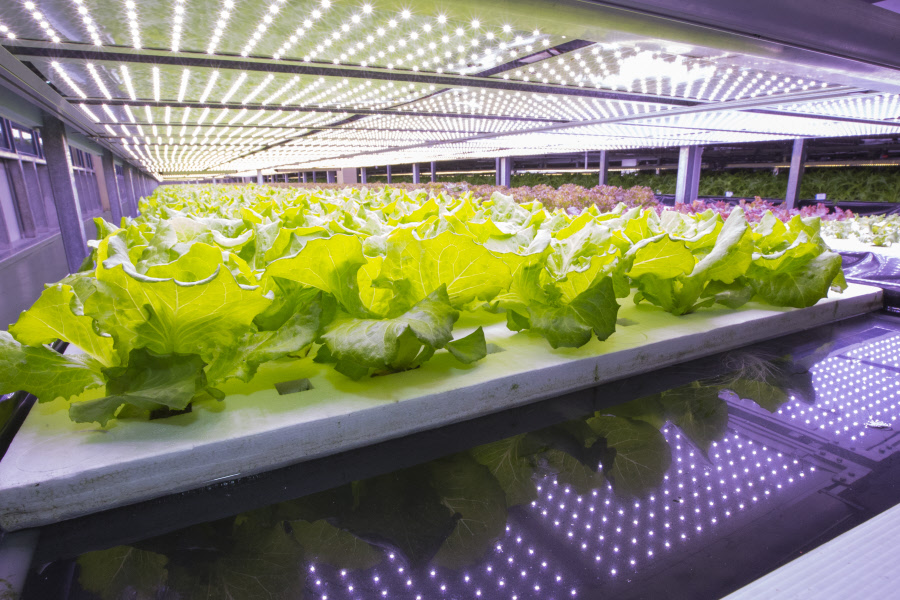
Then an opportunity to apply for a one-year scholarship worldwide came up and Jesper applied to University of California is very strong on Chinese studies.
“I did a one-year programme of combined history and Chinese studies. That really took me to the next level of understanding Chinese – learning how to read and write and how to understand more technical conversations.”
“Next, a Taiwanese representative office in Copenhagen contacted my Professor with the offer of some of the best students from Copenhagen to go to Taiwan, paid by the Taiwanese government, to study Chinese. My professor offered that to me and I was granted six months of Chinese studies at Taiwan University – the top university in Taipei. So I took another six months on top of my degree to go there, and I managed to increase my Chinese to an even higher level during my time here,” says the Dane about his new-found home.
“When I was just about to go back to Copenhagen I met my current wife, my girlfriend at the time. I had little time to get to know her before I was going back to Copenhagen, so I told her that I would return after completing my graduation in Copenhagen. And so I did.”
Family job offer
“Once there I first joined a local Taiwanese company that helps large Western manufacturers (American and big customers such as Ericsson in Sweden), with mechanical components, specialising on Wi-Fi devices. My role was sales but just as much a matter of acting as a cross-cultural bridge. During my two years with this company I got very familiar with Taiwanese business and I also experience in how to link a Taiwanese company’s business mindset and way of approaching business with western practice. I was gradually becoming an expert on how to sell something from there to overseas, especially towards the western world,” he explains.
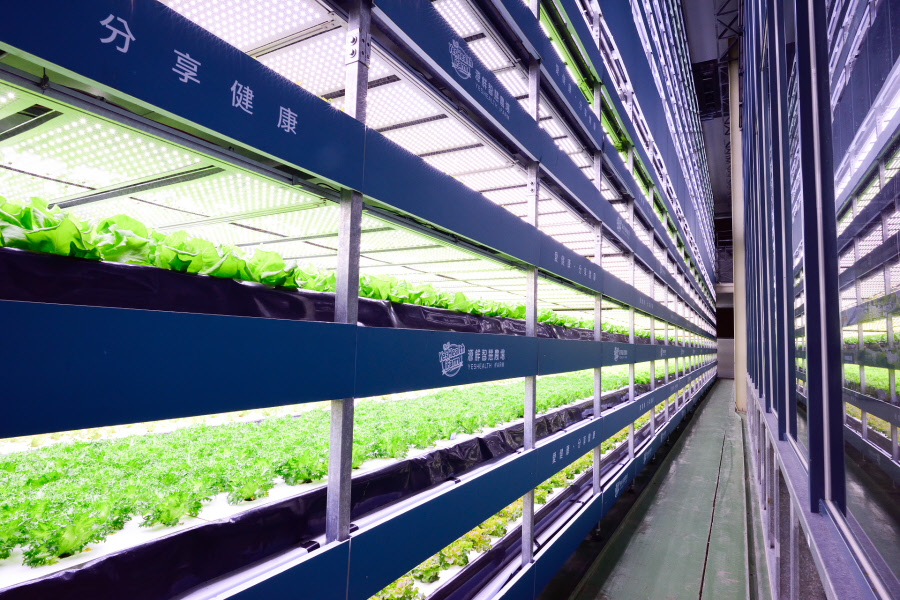
Then, as YesHealth Group was building a larger facility, his Taiwanese father in law took Jesper under his shoulders and offered him to join the company and work on its global expansion.
”So I joined and then spent about a year before we took on the first project, which was in China in 2018. And we succeeded in delivering that project in Shenzen and that remains one of the largest farms ever built up to today. And from 2019 onwards I started developing projects in Europe.”
Danish partnership
First out is Denmark, where in the fourth quarter of 2020 Nordic Harvest began operations of its vertical farm in greater Copenhagen, which will with full production capacity yield more than 3.000 kg every day, making it the most efficient vertical farm in Europe to date.
This Danish start-up that aims to make food production more sustainable has been made possible through a business partnership with YesHealth Group.
“Nordic Harvest ApS is backed by prominent investors and leaders within business, the food industry, and agriculture making Nordic Harvest an ideal partner,” says Jesper.
It has more than 40 private investors, aside some bigger investors and lenders like Vækstfonden, the Danish government’s financing fund for venture capital & private equity; and Danmarks Grønne Investeringsfond, a new, independent investment fund that co-finances investments supporting the transfer to a green society.
As an investor Yeshealth has also contributed capital towards setting up the Danish food business. “And we have a significantly larger stake through our technology transfer; licensing our technologies and proprietary formulas.”
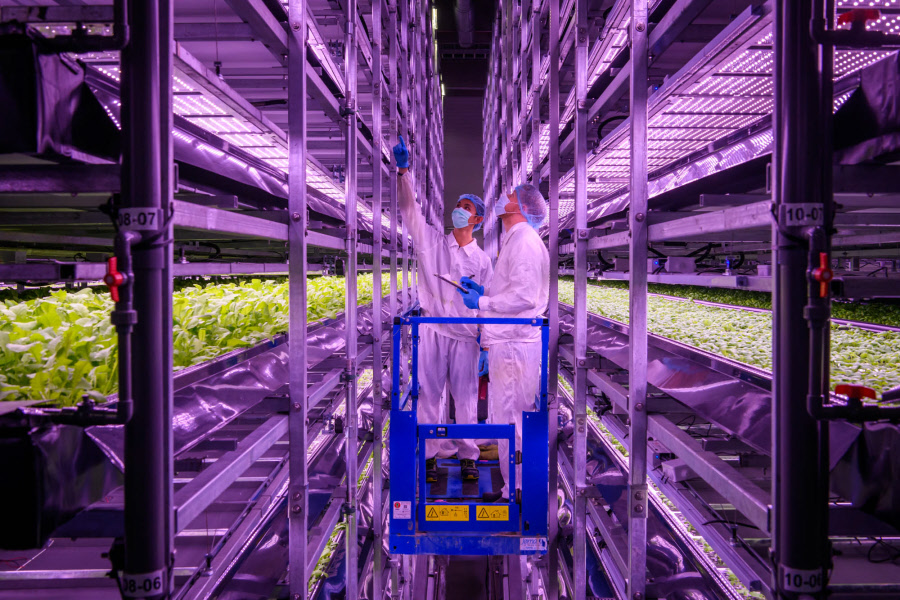
Setting up sales and distribution, marketing and operating the business is done by Nordic Harvest, while Yeshealth looks after everything relating to technology.
“We are building the next phase in 2021, which will almost triple the capacity to around 1000 tons per year – to be completed and fully operational by early next year.”
The grow area is utilised optimally by placing the plants in floors. By having full control over the plants’environment the best conditions is created for their growth. Therefore, the indoor farm can deliver delicious, tasteful and nutrient-rich herbs and lettuces every day year round – 100% free of pesticides and herbicides.
Nordic Harvest is also one part in a two-pillar idea, by the Danish founder and CEO Anders Riemann, to take away the need for traditional farmland and instead grow vegetables inside cities. Farmland outside the cities should be returned to nature by growing forests, creating lakes etc.
“What we call nature in Denmark consist in farmland everywhere, and that’s not what nature looks like before. It’s all artificial – made by people. We should have untouched forest, which we almost don’t have any more. So the idea is to regenerate and create a better balance in the ecosystem.”
Making it sustainable and viable
The start-up also has further plans to expand into the other Nordic countries over the next years.
Jesper called the Danish launch proof “that it is now possible to commercialise vertical farming produce on a large scale and that this produce will be able to support the traditional farming sector from now on. Vertical farming is no longer just a theoretical concept for the garage.”
Favourable conditions in various markets and countries can vary. “It can be a combination of climate conditions favouring indoor farming, coupled with inexpensive energy or access to green energy. We are not dependent on the weather, so this enables us to supply the whole world locally. We can build a farm even in Greenland or Iceland if we want to and supply locally and take out the need for transportation,” says Jesper.
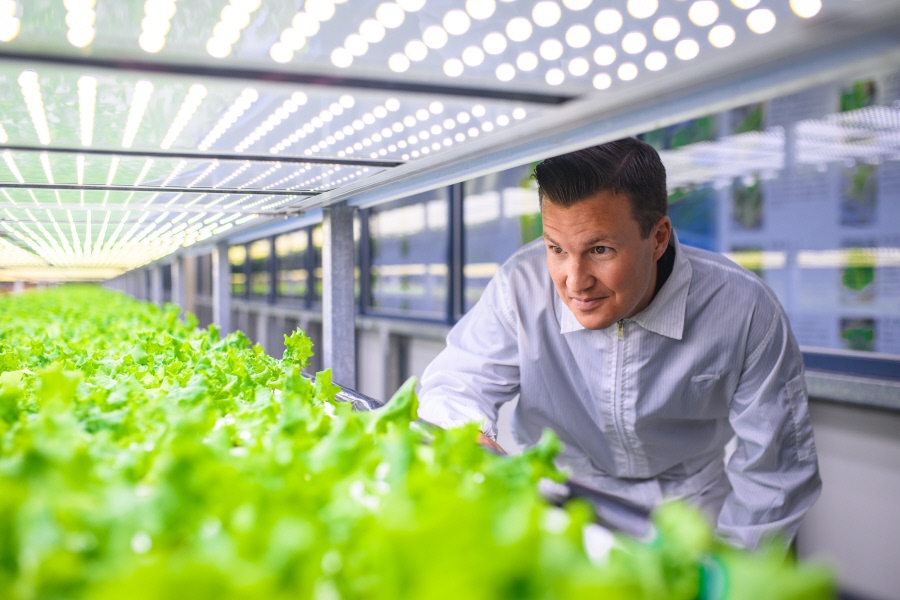
“The harsher the climate is outside the better our technology is because it means you cannot grow outside. But it also means the more difficult it is for us to control the temperature inside. And we try purposefully to link our technology with green energy resources. Actually in the case of Denmark, including the wind power, electricity is not inexpensive. But it’s clean, so we don’t have the carbon footprint. The link with green energy sources is a driver and whether or not there is a market for high quality sustainably produced produce,” adds the Dane.
“In Denmark we are the only large-scale vertical farm. So the competition comes from overseas’ producers. We identify which crops that can be, and are grown, in Denmark, and we purposely grow other things. We are trying to take away import to Denmark. Competitors would be from countries like Italy and Spain. But we’re selling at a certain price point – because the cost structure is still relatively high compared to outdoor farming. The challenge is to make it a sustainable and viable business by being able to offer produce that doesn’t cost more than the traditional. So our goal is to bring down the cost so that this kind of quality and healthy produce is available to anyone,” he continues.
This is something they will achieve gradually, partly via technology improvement in terms of driving down cost. LED technology, for instance, becomes better and better and lower in cost. The same goes for software and automation.
“There is also an operational aspect that you get better and better at operating these farms, so using the same input in money and labour we can get more and more out of the farms,” says Jesper. “So there’s a learning curve in terms of being better at that but there’s also technology improvement over time.”
“With all of our technology in-house, YesHealth Group will be able to utilise real-world data from vastly different climates and environments and improve our technology at an even greater speed and efficiency.”
The Taiwanese company is the developer of all the technology that underpins their vertical farms such as engineering design, climate control systems, fertiliser and micro-biology, automation design, and data collection and management.
Bugs and insects on the market
YesHealth Group was actually mainly started to solve the issue with pesticides: “Taiwan is a hot country with lots of bugs and insects in nature. So the farmers have to spray a lot of pesticides on the crops. By bringing farming into a closed environment, relying on LED for light source instead of the sun, we have a whole lot of advantages. For instance, we can skip all the harmful chemicals and pesticides – we don’t need them anymore; they belong to the outside world. We can also use significantly less fertilizer and water to achieve the same result. We hardly use any other water than what goes into the crops, so it’s very resource-efficient. Then, in some areas like for instance Singapore, we have the ability to grow a lot on a very small footprint.”
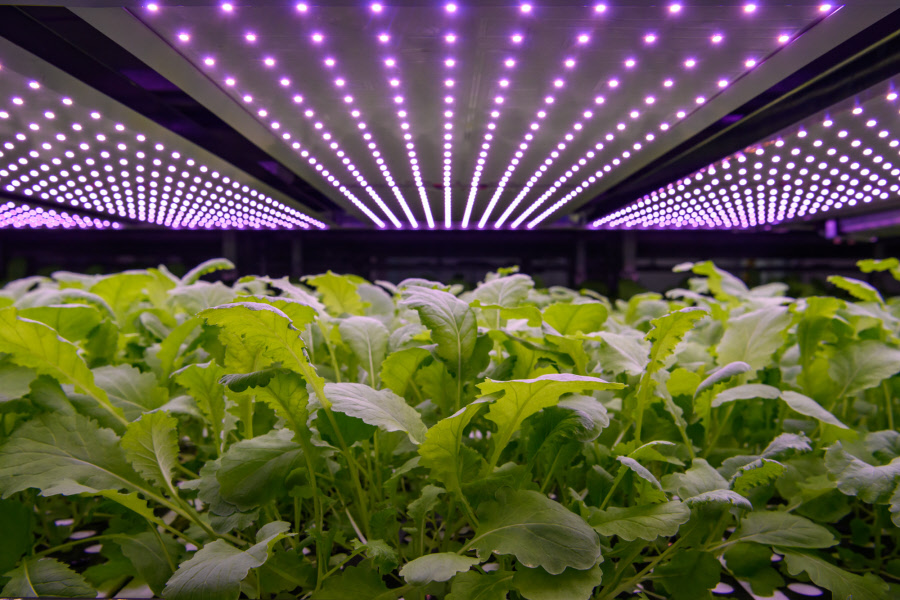
Over time the Taiwanese company has developed technology and become experts at running these large farms that are suitable solutions also for export. “And our combination of being both a technology developer and manufacturer, and an operator, gives us a competitive edge towards many of our competitors who focus only on making the equipment; they don’t have live insights from operating these systems. We are one of the few companies that have been operating these farms over a number of years.”
“Almost everything essential to a vertical farm, such as LED lighting, is proprietary; something we developed. The same goes for the automation equipment – everything is made in-house.”
“We have something called ‘Nano bubble oxygene injection system’, which we use to induce oxygen in water. We have some 50 patents of which some are only here in Taiwan and some are international, but, actually most of our core technologies are what we call trade secrets,” informs Jesper.
In Taiwan they have a cost competitiveness advantage, but it is by no means any easy market for vertical farming and thus a tough test-bed. “Some of the values – for instance being pesticide-free and sustainable – are things that just don’t resonate. Taiwan is a little bit behind Europe and the U.S in focusing on these kinds of things, so selling the produce is more difficult. The fact that traditional produce from the field is extremely cheap in Taiwan also contributes to that. Hence, the price gap between the traditional produce and our premium produce becomes higher, whereas in Denmark people are used to eating organic, pesticide-free, high quality produce. There, we don’t have to fight this price gap and change people’s perception. We just tap into the mass market, while in Taiwan we’re still a very premium product and a niche.”
“The way we see vertical farming is that it’s never going to replace traditional farming: it’s just going to be a big niche technology that will have applications in areas where you cannot grow, or have a problem with pesticides. And providing year-round pesticide-free, safe and healthy vegetables is part of a larger trend, which is to move away from the need for meat everyday to a more plant-based diet. This is the kind of trend we are tapping into.”


One Comment on “Nordic Harvest: Danish-Taiwanese indoor farming collaboration”